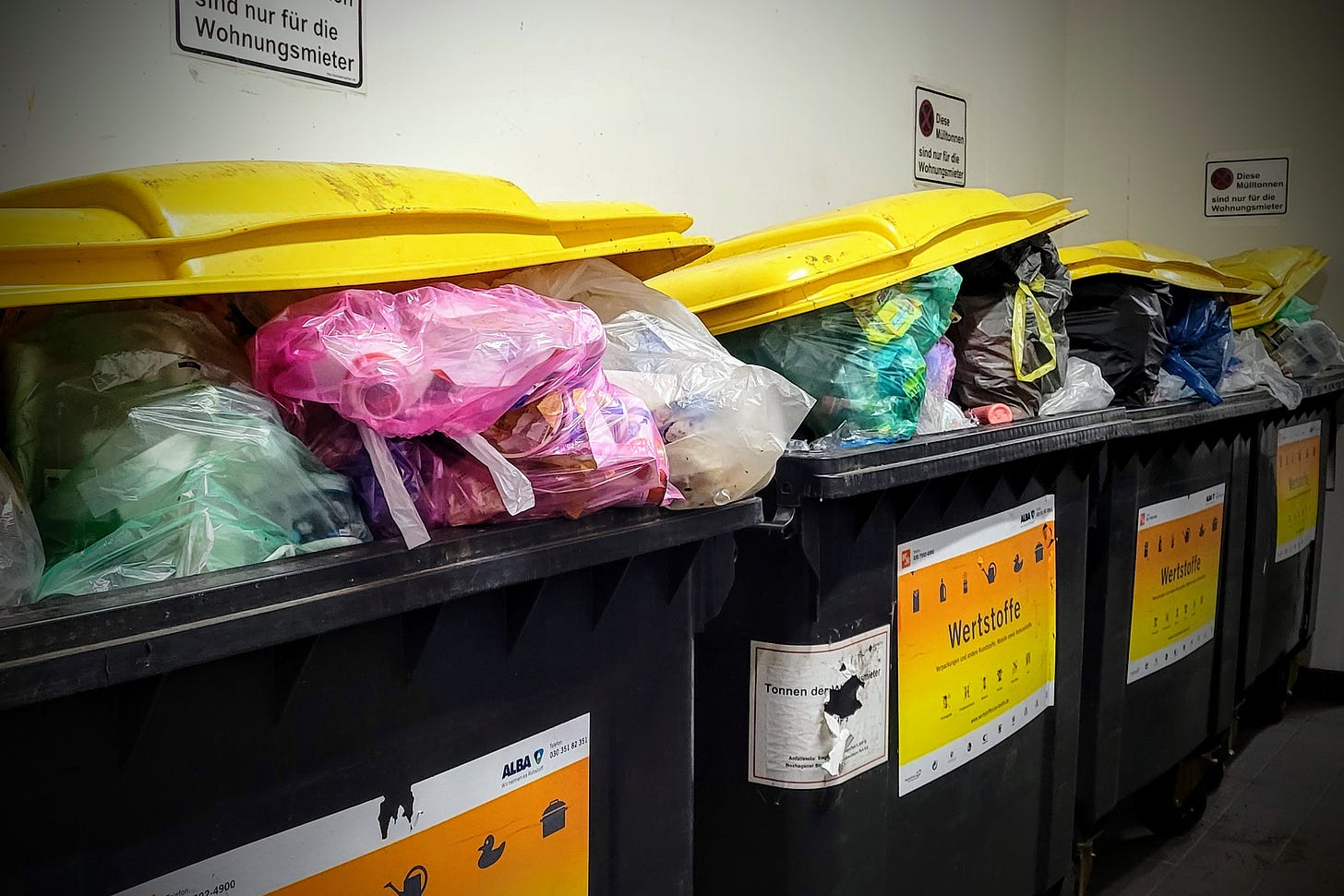Talking Trash
In which I become 'that' neighbor

I took the photo, above, about three weeks ago after a visit to my apartment building’s Müllraum (literally - trash room, where the recycling and garbage bins stay when they aren’t by the street for collection).
It’s hard to tell from this view, but several of the plastic bags contain items that are not allowed in the Wertstoffe bins mixed in with things that are. Wertstoffe is the Berlin sanitation service’s term for, basically, anything that can be recycled but isn’t paper, glass, or food waste.
My plan at the time was to post it on my building’s WhatsApp group with a sanctimonious plea to please mind the sorting regulations lest the building get a fine.
I thought better of it after I got back to my apartment, remembering that we share access to the Müllraum with both the residents of the adjacent apartment building and the commercial tenants on its ground floor. I couldn’t be sure it was any of our newer tenants, and I wasn’t comfortable with potentially misdirected passive aggression.
Most non-Germans living in Germany have a story about that time they were reprimanded for separating their trash wrong. Commonly, this is delivered via an anonymous note on the door - sometimes with the offending bag of poorly sorted material left there as well.
Germans take their Mülltrennung (trash separation) seriously.
History of recycling in Germany
Large municipal waste sorting programs had already been established in different areas in the German Empire starting in 1907. But Germany’s modern system of sorting recyclables for collection was started in East Germany (the Deutsche Demokratische Republik) to reduce the amount of expensive raw materials the country needed to import. The system provided financial incentives for citizens to bring in recyclable materials rather than throw them out.
West Germany created national trash disposal regulations in 1972 that also required any recyclable materials to be separated from general waste. With reunification in 1990, the two countries merged their regulations.
So, even though the current comprehensive system only dates to about 2015 - trash separation has long been embedded in the German culture.
This long history helps explain why Germany leads the EU in recycling - as of 2019 - it recycles 67 percent eligible materials, above the target rate set by the EU for member nations to meet by 2035. Overall, the country recycles 47 percent of its trash.
In the United States, by comparison, residential households only recycle about 21 percent of materials that can be recycled.
This video, from the Youtube channel My Merry, Messy German Life explains household recycling in one state in southern Germany. They have it harder than we do—they even have to sort the different types of paper.
Penalties for doing it wrong
The German waste separation system has been so successful largely because it takes both a carrot and a stick approach. Many glass and plastic bottles can be returned to stores for a cash rebate (known as pfand) to encourage people not to throw out the most easily reusable or recyclable materials.
On the flip side, individuals and properties can be fined for failing to sort their household waste properly. Fines assessed against a multi-family building will be divided up and added to the nebenkosten (the yearly maintenance costs that are added to your apartment’s ‘flat’ or ‘cold’ rent).
The same strategy holds if the building management needs to add more Restmüll (general trash) bins, which cost more to be collected. The additional cost will be passed on to the residents.
In Berlin, buildings that are repeatedly in violation can be penalized by Berlin Stadtreinigung (BSR) with a refusal to collect the trash. The building management must then arrange a special trash collection to empty the bins so that BSR will agree to service them again. This is expensive and the building management will either assess the cost against the residents they believe are in violation or the building as a whole.
So, there’s a good reason why your German neighbor gets so worked up about the trash. Nobody wants to pay higher rent because their neighbors can’t be bothered to separate plastic, paper and glass.
In our case, I opted to just leave it to our Hausmeister to say something. In the end, they must have handled everything because all of the bins were emptied that Tuesday without a hitch.
This time.
More German Trash Talk
Read up on the many (many) ways to recycle in Germany that I didn’t mention in my post. For example, where to take your glass bottles that aren’t pfand-able; what to do with old electronics, where to take your used batteries, and more.
How to Germany: All About Recycling
Earth.org: How Waste Management in Germany is Changing the Game



I was so shocked by the extreme commitment to Mülltrennung when I first moved to Germany from the US, as well as how seriously my German husband takes it... after 5 years I've mostly accepted it, though I sometimes still have to roll my eyes a little! My American parents are so confused every time they visit...
Good decision to leave it to the Hausmeister to deal with it. That cash rebate is a good idea.